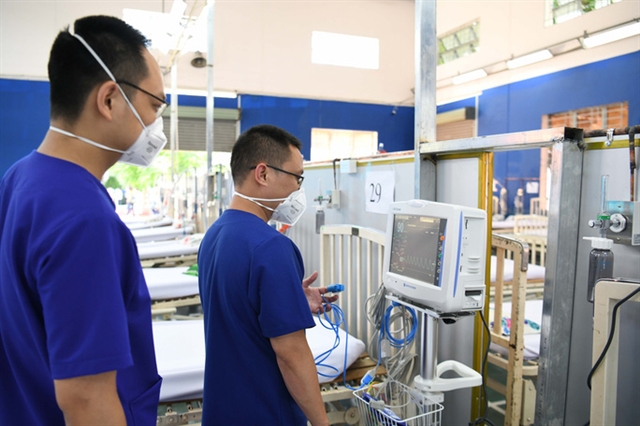 Society
Society

More medical personnel from other provinces are being deployed in HCM City, Việt Nam’s COVID-19 epicentre, as the burden on hospitals worsens and as the city considers paying recovered COVID-19 patients, who have high natural immunity, to help with prevention and control activities.

|
| A field hospital for COVID-19 patients in HCM City's Phú Nhuận District opened on August 12. The city is in serious need of more medical personnel to meet demand at healthcare facilities. – Photo nld.com.vn |
HCM CITY — More medical personnel from other provinces are being deployed in HCM City, Việt Nam’s COVID-19 epicentre, as the burden on hospitals worsens and as the city considers paying recovered COVID-19 patients, who have high natural immunity, to help with prevention and control activities.
The city is in need of 12,000 more personnel, including doctors and nurses who can treat symptomatic patients with underlying medical conditions from the second to fifth levels. Medical staff skilled in resuscitation and intensive care are especially needed.
Many hospitals are struggling to care for more COVID-19 patients. The COVID-19 Resuscitation Hospital set up in Thủ Đức City, which has admitted over 1,000 severely and critically ill COVID-19 patients, is in dire need of more medical personnel since the number of patients admitted has exceeded its capacity.
Trần Thanh Linh, deputy head of Chợ Rẫy Hospital's intensive care unit and deputy director of COVID-19 Resuscitation Hospital, said the latter was designed to have 500 beds for its first phase, but currently it is already treating around 600 patients.
It has been receiving personnel from Chợ Rẫy Hospital and is working on improving its treatment capacity to 700 hospital beds.
While medical equipment there is still able to satisfy demand, more machinery and medicines will be needed in the future, he said.
Sixteen field hospitals have been established to treat the rising number of F0 (infected) cases. The Phú Nhuận COVID-19 No. 1 Field Hospital, for example, was put into service on August 12 in Phú Nhuận District.
The hospital treats second and third-level patients according to the city’s five-level admission and treatment plan for COVID-19 patients. The patients at the hospital include symptomatic cases with underlying medical conditions who may become moderately or severely ill.
With 350 beds, including 60 beds for resuscitation, and a wide variety of medical equipment, it aims to reduce the number of worsening F0 cases who need to be transferred to hospitals for specialised medical intervention, alleviating stress on such facilities.
The field hospital currently has 65 medical staff treating more than 20 patients.
Dr. Tăng Chí Thượng, deputy director of HCM City’s Department of Health, said that city districts must be proactive in finding, admitting and monitoring local F0 cases.
According to the HCM City Centre for Disease Control, the city has nearly 58,000 medical staff and 20,000 personnel involved in the fight against COVID-19.
More than 4,000 personnel are from central hospitals and other hospitals in provinces and cities, and there are tens of thousands of volunteers.
Help from recovered patients
Chairman of HCM City People’s Committee Nguyễn Thành Phong has asked the Health Department to suggest payment policies for recovered COVID-19 patients who could help the city in COVID prevention and control activities.
The city has a total of 65,135 COVID-19 patients who have been discharged from hospitals since January.
Vice Director of the National Hospital for Tropical Diseases Nguyễn Trung Cấp told Vietnam News Agency that most people who have recovered from COVID-19 are likely to be immune for several months afterwards. One study concluded that immune responses from past infections reduced the risk of reinfection by 83 per cent for at least five months.
However, even though the COVID-19 reinfection rate is low, it is still possible, so people recovering from COVID-19 must take preventive measures and get vaccinated as soon as possible, Cấp said.
Phong has also asked city departments to conduct a survey on human resources and medicine at designated hospitals and, based on the results, make decisions about the best use of staff, medicine and transfer of COVID-19 patients.
The city also asked the Ministry of National Defence and the Government’s special task force to add more doctors and nurses to field hospitals and COVID-19 treatment hospitals, and increase contact tracing, testing, and the number of vaccination sites.VNS




